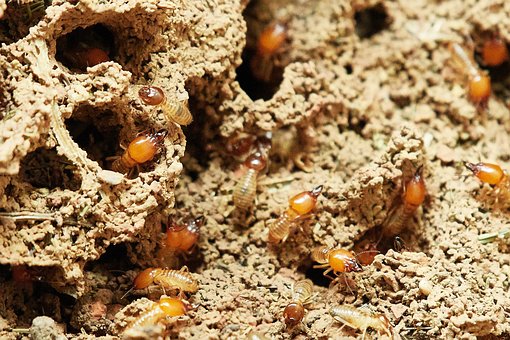Termite Treatment Options Castle Hill NSW – Emergency Residential Exterminators
The longer you wait, the worse your pest infestation can get. If you suspect you have a pest problem in Castle Hill, don't delay. Call us now!
The longer you wait, the worse your pest infestation can get. If you suspect you have a pest problem in Castle Hill, don't delay. Call us now!
 A termite assessment is the primary step in termite management
A termite assessment is the primary step in termite management
Termites and the termite swarm have become part of our natural world for millions of years. Also commonly called white ants they are resilient and relentless, being found, on average, in every 3rd property.
Australian conditions are especially suitable for termites. The Australian standard suggests that a termite assessment be performed every 12 months and regularly in high risk areas.
Contact us to book your yearly Termite Evaluation.
Termite baiting does not involve spraying chemicals or trenching. Stations are put in particular areas around your home and when termite activity is discovered, baits are put inside the existing stations. The termite bait used is non-chemical that contains an active ingredient, so reliable that only a percentage is needed. Termites ingest the bait and carry it to back the colony where they share it with other termites.
 Termite dusting is the first phase of a termite treatment as it entails utilizing active termites. Sydney’s Castle Hill Pest Controluse Termidor Dust which is non-repellent and is 95.5% food alpha cellulose, the same material used as the food source in most of the termite bait systems.
Termite dusting is the first phase of a termite treatment as it entails utilizing active termites. Sydney’s Castle Hill Pest Controluse Termidor Dust which is non-repellent and is 95.5% food alpha cellulose, the same material used as the food source in most of the termite bait systems.
To Apply Termidor Dust: Little holes are made in plagued timber or straight onto termite tracks. Utilizing a little puffer, fine dust is puffed directly onto termites within the infested timber, these holes are covered to seal the workings, to prevent any dust getting away and to minimize disturbance of the termites.
The termites will continue togo about their regular activities long enough to transfer the Termidor Dust to unwary termites within the colony. It will generally take 3-6 weeks for the colony to be impacted by the dust.
Termite dusting however does not provide an on-going security to a building from future termite attacks. There might be more than one termite nest within striking distance and termites are constantly establishing brand-new nests.
This is why a termite soil treatment is crucial following termite dusting.
Termite Soil Treatment: Termite soil treatments are the favored choice for eradicating termite infestations. Nevertheless, soil treatment does depend on the building design of your home and can be discussed with the professional on the day of the termite assessment.
Termite soil barrier treatments are applied to soil areas in which the structure is in contact with consisting of:
If the range between the soil and flooring woods is greater than 400-mm the soiled areas within the subfloor are trenched and dealt with. In any case we generally choose to treat the whole of the subfloor. This increases surface area coverage in the subfloor and for that reason increases the probability of termites coming into contact with Termidor.
Concrete borders are drilled at approximately 20 to 30-cm centres (1.2-cm holes), injected and re-concreted, as if nothing took place.
These areas could consist of:.
Repellent: Repellent termiticides work by developing a termite hazardous barrier around a house. The treated areas become a no-go zone for termites. In order to work correctly, these termiticides need to be applied in an unbroken zone around the foundations. This can be challenging to achieve due to the building and style of your home and if there is concrete against the house. Repellent termiticides are mainly used throughout the pre-construction phase.
Non-repellent: With non-repellent termiticide, termites are unable to find that an area has been treated and thus do not avoid the treated location. When the termites go through the termiticide, they make contact with the active ingredient, return to the colony and infest the unwary termites, which will lead to their extermination.
Castle Hill Pest Control offers a 5-year warranty on non-repellent treatment. Conditions do apply and are subject to the house structure and style.

The monitoring and baiting is a complete system that includes
Termite baiting systems work extremely well, and when a colony is gotten rid of or controlled, the termite monitoring stations will continue to secure your home against new termite activity. The approximated time of colony removal is 3– 6 months.
In most cases your home is the most pricey item you might own; do not let it be gnawed by termites!
Looking for termite control services in Castle Hill and Baulkham Hills, Glenhaven, Cherrybrook, West Pennant Hills, North Rocks, Bella Vista, Kellyville, Winston Hills, Beecroft, Dural? Call us today!
We take great pride in ourselves as among the many few companies that feature an affordable pricing policy. Regardless of your budget plan, rest assured that we will work something out for you! Our experienced exterminators are happily waiting for your call. Get in touch with us now!
Other services we provide include Termite Treatment, Cockroach Removal, Ant and Spider Removal, Rat and Mouse Removal, Bed Bug and Flea Removal, and many more.
Remember, we’ve got offices in Baulkham Hills, Glenhaven, Cherrybrook, West Pennant Hills, North Rocks, Bella Vista, Kellyville, Winston Hills, Beecroft, Dural and Castle Hill
Other locations we cover include: Baulkham Hills, Kellyville, Hornsby, Parramatta, Blacktown, Ryde, Fairfield, Sydney
© allkillpestcontrol.com.au | Privacy Policy | Home